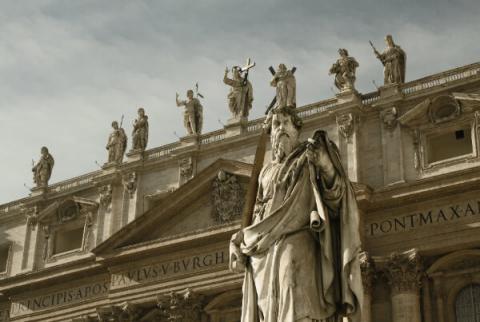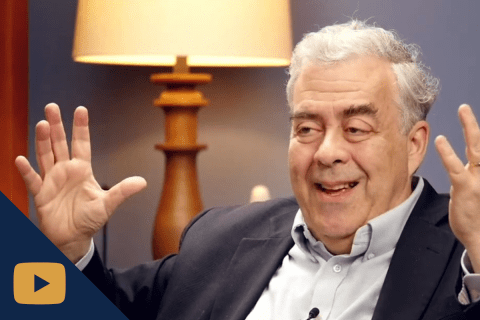
"The starting point or principle is more than half the whole matter." - Aristole, Nicomachaean Ethics
When Thomas Jefferson wrote in the famous American Declaration of Independence, “We hold these truths to be self-evident” – (Jefferson had originally written “sacred and undeniable”) – “that all men are created equal, that they are endowed by their creator with certain unalienable rights,” and so on, he was laying down the basis upon which the claims of the document would rest. He was enough of a philosopher to know that he had to begin with clear assumed principles; otherwise, he would be making arguments in mid-air. Such assumed first principles are a necessary aspect of any given line of thought. They cannot be proven. They are either considered undeniable (hence the term “self-evident”) like the principle of non-contradiction, or they are perceived intuitively like the claim that moral good and evil exist, or they are held on what are thought to be reasonable grounds such as the dogmas of a revealed religion. These foundational principles are not argued for, they are argued from. They are the starting point for all serious thinking, and, for that matter, for all unserious thinking. Every science and every academic discipline begins with them; every opinion about what is good or evil rests on them; every theory about human society or individual human happiness is founded on them.
A prime quality of a well-trained mind is the ability to know what first principles it has itself assumed as the starting points of its thinking and to perceive the first principles that undergird the ideas, opinions, and actions of those around them. Furthermore, a clear mind understands what is required to ground first principles reasonably. This kind of clarity of mind is more than just a nice academic accomplishment: the possession or the lack of it brings serious consequences.
Most of the angry arguments that so trouble our current social world are expressions of just this type of fundamental disagreement. Each side thinks the other to be stupid or unreasonable when discussing a specific matter because each has assumed a different set of principles that stand behind their opinions and give them coherence. Assumptions concerning what a human is, about what makes for human happiness, or about where we have come from and where we are going will precipitate all kinds of conclusions that touch on everything from politics to morality to seemingly trivial matters like fashion and music choices. All humans are philosophers, although they do not always know it. We all ground our opinions and our behavior on fundamental philosophic principles that we have picked up somewhere along the way.
According to the grace of God given to me, like a skilled master builder I laid a foundation… For no other foundation can anyone lay than that which is laid which is Jesus Christ.
The necessary existence of first principles applies beyond the individual. Institutions of whatever kind, whether businesses, political groups, or entire societies, are not faced with the question of whether to espouse a set of founding philosophic principles or instead remain “neutral” and “objective.” Rather, the question they face is what their foundational principles will be. Modern secular groups and institutions often claim to espouse no such philosophical commitments at all. Unfortunately for their projects and for those they serve, this lands them in profound confusion of thought, a confusion that can lead to serious personal and societal disorder and often to a great increase of human suffering. It is not possible, even if it were desirable – which it is not – to negotiate the world from a position of neutrality as regards first principles.
The importance of foundational principles is especially clear in the case of universities. All educational practice presupposes a specific anthropology founded on a set of assumptions about humanity and the world we inhabit, assumptions that cannot simply be proven. Every educational goal presupposes standards of success that come from those commitments. There is no such thing as a philosophically neutral educational program. It follows that an understanding of the philosophical commitments of any given educational establishment or pedagogical theory is a crucial step in dealing wisely with it. It also follows that a Catholic university that hopes to have a consistent educational mission will identify and build upon Christian founding principles, rooted in the Catholic spiritual, intellectual, and cultural tradition. These will provide the starting point for its project and will give it intellectual coherence.
At Prime Matters, we are interested in investigating and understanding the assumed principles that undergird the Christian vision of the world, as well as those that provide the ground for other views of reality prevalent around us. We are convinced that whatever the debates and concerns our society and our world may face, we will all be in a better position to make a positive contribution when we are clear about the deep sources from which different views arise and when we grow in our understanding of how to identify and reasonably ground strong and true first principles.

Next: The Intellectual Life
The New Testament makes clear that the mind is the key area of battle and conversion, and the key task of the Catholic university is to initiate students into the Catholic imaginative vision.

Previous: Awakening the Catholic Imaginative Vision
Prime Matters has arisen as a response to our time, seeking to keep before our minds the contours of the Christian vision in all its spiritual, intellectual, moral, and cultural richness.


